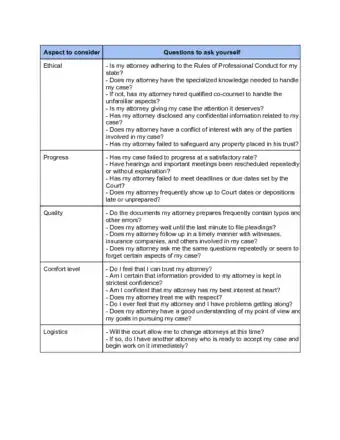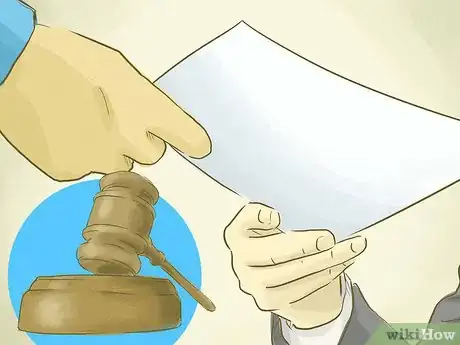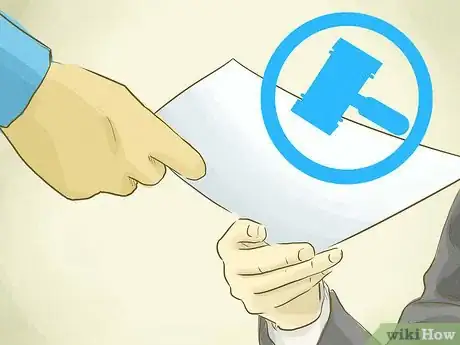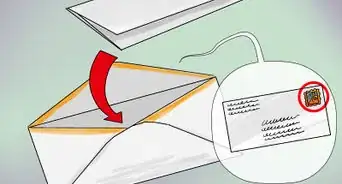This article was co-authored by Clinton M. Sandvick, JD, PhD. Clinton M. Sandvick worked as a civil litigator in California for over 7 years. He received his JD from the University of Wisconsin-Madison in 1998 and his PhD in American History from the University of Oregon in 2013.
There are 13 references cited in this article, which can be found at the bottom of the page.
This article has been viewed 91,413 times.
After you hire a lawyer, it’s possible that problems can develop and your relationship can break down. For example, the attorney may fail to vigorously investigate all aspects of your case or fail to meet crucial filing deadlines. Likewise, you may discover your attorney lacks sufficient knowledge in a given legal field, often fails to provide timely case status updates, or even makes unethical choices that may threaten the success of your lawsuit. Though it is not always beneficial to change lawyers in the middle of a case, you should be alert to common signs that your attorney needs to be replaced.
Steps
Cheat Sheet
Knowing When to Change Lawyers
-
1Study the ethical rules. Lawyers must abide by certain rules when representing clients. These rules are called the Rules of Professional Conduct. If you spot that your attorney has violated an ethics rule, then it may be time to get rid of him or her. To find your state’s Rules of Professional Conduct, follow the link listed under your state on the American Bar Association’s (“ABA”) page.[1] The Rules of Professional Conduct include:
- Competence. An attorney must be competent in the area(s) of law required to represent each client. If a lawyer does not possess the knowledge or skills required to represent you, he or she should not take your case or should retain competent co-counsel.
- Diligence. Lawyers are required to represent each client with reasonable diligence.[2] Reasonable diligence means that the attorney must represent you in spite of personal inconvenience. In fact, the attorney is required to manage his caseload so that he can address your matter competently.[3]
- Confidentiality. Certain confidential information you give to your attorney should be kept confidential. Not all information is confidential, however, and there are exceptions to the general rule of confidentiality. [4] Nevertheless, if your attorney shares information about your case with a third party (such as a spouse or friend), then you should be alarmed.
- Avoiding conflicts of interest. A lawyer may not represent parties with conflicting interests without written consent from all parties. This written consent must indicate awareness of the conflict and include an express waiver of the party's right to an attorney without a conflict.[5]
- Safeguarding property. Any property transferred to an attorney must be kept in a safe place, separate from his or her own. This includes funds, which should be kept in separate trust fund accounts.[6]
-
2Look over your bill. You may be unhappy with the costs of the litigation. Look over your monthly bills. If you do not have copies, then ask the attorney to provide them to you.
- You should not see any charges for clerical support or any unannounced increases in hourly billing.[7]
- Your bill should be itemized. It should specify what task was performed and how long it took. Multiple tasks should not be lumped together under vague headings like “work on case.” If your bill is not itemized, request that it be done.[8]
- Also look at your engagement letter, which you should have signed at the start of the representation. The engagement letter should have spelled out in detail what type of work would be billed and the hourly rate charged.
Advertisement -
3Assess how happy you are with communication. Your attorney should respond to emails and telephone calls promptly, within a business day.[9] If your attorney takes longer—or never responds—then you may have grounds for dismissing the attorney.
- Also assess the quality of the communication. Do you feel comfortable talking to your attorney? Do you trust her judgment, or do you find her evasive? Your attorney should inspire confidence but should also acknowledge when she doesn’t know something.
- Think about how well you understand your case. Even the busiest attorney should have taken the time to explain the case to you whenever you request it.[10] You should understand where you are in the litigation: at the pleading stage, at the discovery stage, preparing for trial, etc.
-
4Determine if your case is moving forward as it should. Slow litigation is frustrating. However, your attorney is not entirely in control of how quickly your case advances. She has to work around the schedules for both the court and opposing counsel. Nevertheless, there are definite warning signs that the lack of forward motion in your case is being caused by your attorney:
- Continuances without explanation. If hearings and/or depositions are being rescheduled for later dates without any explanation from your attorney, you may want to consider finding an attorney who is more interested in defending your case.[11]
- Missed due dates. If you receive a notice from the court or a letter from the other party informing you that your attorney has missed a due date, there may be a problem. While lawyers do make mistakes, missing a due date can have a serious negative effect on the outcome of your case.
- Arriving late or unprepared for hearings. Does your attorney arrive at hearings or depositions on time and prepared? If he is frequently running late, or appears to be phoning it in, then it may be time to find a replacement.
-
5Assess the quality of work your lawyer is producing. Read the documents your attorney files in the case. Are they filled with typos and vague language? If so, the judge will not be amused and you probably are not getting top-quality representation.
Meeting with Your Lawyer
-
1Schedule a meeting. If you have concerns about the quality of representation, you should meet with the attorney. Even if your lawyer claims to be too busy, you should insist on at least a 15 minute meeting. Any lawyer too busy to meet you in person will be too busy to take your complaints seriously if you put them in an email. Accordingly, you should insist on an in-office meeting.
- If you have a public defender, then you should call the public defender’s office.
- Don’t wait to schedule the meeting. It is wiser to raise concerns, especially over billing, sooner rather than later.[12]
-
2Bring documents. If you have concerns over billing, then you should bring copies of the contested bills. Also bring copies of any pleadings or communications (emails, letters) that you want to discuss. It is helpful to have the document handy for both of you to look at.
- Use a highlighter to flag any items on a bill that concern you. Also highlight the portion of the engagement letter that you think the attorney has violated.
-
3Raise concerns. Speak honestly with your attorney about your concerns. Try not to accuse anyone of malpractice, but do be honest about your frustrations with the representation.[13] Refer to your notes if necessary, and be sure to address all of your complaints.
- Listen objectively to your attorney’s explanations. Sometimes innocent errors do occur. Perhaps a clerical staff member entered a wrong billing code, or perhaps the lawyer suffered a recent health scare and did not have time to respond to your calls.
- If you are not yet ready to change lawyers, then ask your current attorney at the meeting how he plans to remedy the problem. Will he reduce your bill? Will he promise to respond to telephone calls within one business day?
-
4Write a letter. After meeting with your attorney, you should write a letter summarizing the conversation. In particular, include what the attorney promised to do, if anything, to remedy the problem.
- Keep a copy of the letter for yourself. If you ever have to file an ethics complaint or bring a malpractice claim, then this letter may be helpful. The letter may also be useful when you terminate the representation.
Changing to a New Lawyer
-
1Ask the court if you can change. If a hearing, deposition, or trial is scheduled within the next few days, many courts will not let you switch attorneys, as it will take a new attorney time to get up to speed and it does not want to delay a case any more than necessary.
- Call or visit the clerk’s office to find out what the rules are concerning changing attorneys and then plan to switch at a time when the court is likely to allow it.
-
2Find a new lawyer. Make sure you have a new attorney on retainer before you fire anyone.[14] It is not a good idea to be without competent representation for even one day in the middle of a lawsuit. Find a new lawyer before you dismiss your current one.
- Find a lawyer in the same manner that you found your current one. If you gathered referrals from friends and co-workers, then pull out the list of names. If you searched through a bar referral list, then find it again and look at attorney websites.
- To prepare for your consultation, summarize your case in a paragraph. In a few sentences, state what the case is about (e.g., slip-and-fall case at the drug store) and where you are in the litigation process.
- Bring copies of legal documents to the consultation. Since litigation cases quickly become complex, you can refer to the documents to answer questions about where the case stands. (For example, whether the defendant has filed a summary judgment motion.)
- Be prepared to talk openly about what you did not like about your current lawyer.
-
3Terminate the representation with your initial lawyer. In writing, notify the attorney that you are ending the representation. The letter may be brief. Simply state the problems you have with the representation and clearly state that you wish to discontinue the relationship.
- If you met with the attorney before to discuss your concerns, attach a copy of the follow-up letter you sent. This will remind the attorney that you have already met to discuss the issues.
-
4File a motion for substitution of attorney. Once you have a new attorney, you must notify the court of this fact. The procedure differs by state. But in most cases, both your old attorney and your new attorney must sign.
- Check with the court clerk whether the court has a form motion you can fill out. There should be one: attorney substitution is a common procedure, and courthouses often have “fill in the blank” forms for common motions. Here is an example.
- You can include the motion in your letter terminating the relationship with your prior attorney. Be sure to ask that he sign the motion and return it to you. Alternately, you can let your new attorney deal with former counsel.
- Conversely, some attorneys may have to file a petition to withdraw. Generally, the attorney only needs to do this if he ends the relationship. However, it could be used in this situation as well.
-
5File for a continuance, if necessary. Your attorney may need time to catch up to speed. She can file for a continuance at the same time that the motion for substitution of counsel is filed. Before granting it, the judge will consider the reasons for the substitution and the effect of a delay on the case.[15]
- Your new attorney should also send notice to all of the other parties in the litigation informing them that you have new counsel.
-
6Request your file from your former lawyer. Your file will include copies of pleadings, exhibits, original documents (such as a will), and any work product created by your attorney, including digital works. You should request everything.
- State laws may differ as to how they define “the file” and what you are entitled to. In California, “the file” includes “the client paper and property” including “any items reasonably necessary to the client’s representation.”
- Depending on your state, you may have to pay for the cost of copying the file. In New York, you do. In Texas, however, an attorney cannot charge copying fees.[16]
-
7Request return of unearned fees. If you gave your attorney a large retainer, then you may be entitled to a return of any unearned fees.[17] Add up the amounts you have paid and then deduct this amount from your retainer. Whatever surplus remains should be returned to you.
- Conversely, you may have to pay the balance on your bill. Your former attorney cannot refuse to turn over your file for failure to pay your bill. However, he could certainly sue you for the unpaid balance. Accordingly, you should work with the attorney to settle your accounts.
Warnings
- While you always have the right to change lawyers, many lawyers will not represent someone who has changed attorneys very often. Most professionals consider frequent changes of counsel as sign of a difficult client or one whose expectations are unrealistic [18] .⧼thumbs_response⧽
References
- ↑ http://www.americanbar.org/groups/professional_responsibility/resources/links_of_interest.html Links of Interest
- ↑ http://www.americanbar.org/groups/professional_responsibility/publications/model_rules_of_professional_conduct/rule_1_3_diligence.html
- ↑ http://www.americanbar.org/groups/professional_responsibility/publications/model_rules_of_professional_conduct/rule_1_3_diligence/comment_on_rule_1_3.html
- ↑ http://www.americanbar.org/groups/professional_responsibility/publications/model_rules_of_professional_conduct/rule_1_6_confidentiality_of_information.html
- ↑ http://www.americanbar.org/groups/professional_responsibility/publications/model_rules_of_professional_conduct/rule_1_7_conflict_of_interest_current_clients.html
- ↑ http://www.americanbar.org/groups/professional_responsibility/publications/model_rules_of_professional_conduct/rule_1_15_safekeeping_property.html
- ↑ http://www.lawyerquality.com/article_fees/
- ↑ http://www.lawyerquality.com/article_fees/
- ↑ http://hirealawyer.findlaw.com/attorney-fees-and-agreements/what-to-expect-from-your-lawyer.html
- ↑ http://hirealawyer.findlaw.com/attorney-fees-and-agreements/what-to-expect-from-your-lawyer.html
- ↑ https://www.lawyers.com/legal-info/research/how-to-know-when-its-time-to-change-lawyers.html
- ↑ http://www.lawyerquality.com/article_fees/
- ↑ http://www.nolo.com/legal-encyclopedia/problems-with-lawyer-tips-strategies-29925.html
- ↑ https://www.lawyers.com/legal-info/research/how-to-know-when-its-time-to-change-lawyers.html
- ↑ http://research.lawyers.com/changing-attorneys-mid-case.html
- ↑ http://www.tlie.org/newsletter/articles/view/148
- ↑ http://www.chicagonow.com/chicagos-real-law-blog/2015/03/another-way-to-get-unearned-fees-back-from-your-lawyer/
- ↑ https://www.lawyers.com/legal-info/research/how-to-know-when-its-time-to-change-lawyers.html












































































